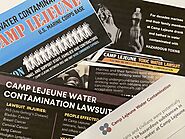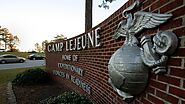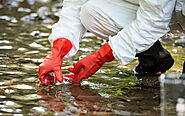-
About
- About Listly
- Community & Support
- Howto
- Chrome Extension
- Bookmarklet
- WordPress Plugin
- Listly Premium
- Privacy
- Terms
- DMCA Copyright
- © 2010-2025 Boomy Labs

 Matthew A. Dolman
Matthew A. Dolman
Listly by Matthew A. Dolman
Dolman Law Group represents marine veterans, their families and private contractors who are now suffering from a wide array of medical issues after being exposed to the contaminated drinking water at Camp Lejeune.
For a free consultation and case review regarding a potential Camp Lejeune lawsuit, call us today at: 833-552-7274
Source: https://www.dolmanlaw.com/camp-lejeune-water-contamination-lawsuit/

If you resided on or spent at least 30 consecutive days at Marine Corps Base Camp Lejeune from January 1, 1957, through December 31, 1987, you might be eligible for compensation via a Camp Lejeune water contamination lawsuit or claim. The Dolman Law Group is representing individuals nationwide who have suffered from a wide array of health issues following exposure to the contaminated water at Camp Lejeune. We are representing individuals with the following diseases and medical issues:
Breast cancer
Bladder cancer
Female infertility
Esophageal cancer
Kidney cancer
Hepatic Steatosis
Miscarriage
Lung cancer
Leukemia
Multiple myeloma
Scleroderma
Myelodysplastic syndromes
Non hodgkin’s lymphoma
Neurobehavioral effects
Renal toxicity
Parkinson’s disease
(please click on the link to this page to learn more)

In this article, we discuss the medical symptoms caused by exposure to the contaminated water at Camp Lejeune. Camp Lejeune's water was contaminated with known carcinigens such as PCE, TCE and Benezene among others.
If you believe that you have symptoms of chemical exposure due to water contamination at Camp Lejeune, seek medical attention asap.
(to learn more, please click on the link to this article)

Contact a Camp Lejeune water contamination lawyer to learn more about whether you can recover compensation for your losses. In this article we provide estimates and analysis of what we believe settlement amounts for Camp Lejeune water contamination lawsuits.
The Dolman Law Group has been intricately involved in a number of mass tort projects including Roundup, Zantac, baby powder, and a host of others. Our projections are merely a guess. However, they are based on our experience representing individuals with similar medical issues caused by numerous defective products.
(click on this article to learn more)

Simply serving at Camp Lejeune, North Carolina, during the 25-year eligibility period isn’t enough to guarantee a cash settlement.The TV ads and colorful mailers have been relentless in recent months: “If you or someone you love served at Marine Corps Base Camp Lejeune prior to 1988, you may be eligible for financial compensation!”
But advocates are warning that tens of thousands of individuals who lived at the North Carolina base will never see a penny from a new law allowing civil suits against the military for water contamination injuries there.
And those who do get payouts probably won’t see any money for months or years.
Shane Liermann, deputy national legislative director at Disabled American Veterans, said, “Veterans need to make sure they’re well informed before they make any decisions about getting involved with these lawsuits, because it could actually cost them money.”
(click on this article to learn more)

Honoring Our PACT Act Signed Into Law: Camp Lejeune Water Contamination Lawsuits Move Forward
Wednesday, August 10, 2022
President Joe Biden signed the historic Honoring Our Promise to Address Comprehensive Toxics (PACT) Act into law today.
Veterans exposed to toxic chemicals during their service are now eligible for new benefits, and with the Camp Lejeune Justice Act included in the bill, those exposed to contaminated water at the Marine Corps Base are able to file lawsuits for damages and injuries.
This is a monumental step forward in helping all veterans exposed to toxic chemicals during service and also a breakthrough in achieving justice for veterans, families, non-military staff, and others who were harmed at Camp Lejeune.
(click on this article to learn more)

The Department of Veterans Affairs (VA) mishandled up to 1 in 3 veterans’ claims relating to water contamination at Camp LeJeune, according to a report released Thursday by the department’s Office of Inspector General (OIG). Some 1 million people may have been exposed to contaminated water at the training facility between August 1953 and December 1987,according to the OIG report. OIG investigators found that the department prematurely denied more than 17,000 of the claims before sending the claimants’ letters asking for further documentation of exposure.
In another 2,300 cases, the department recorded incorrect effective dates for benefit eligibility, according to the report. Not all the mishandled cases would necessarily have resulted in benefit payouts, but veterans were underpaid by at least $13.8 million over a four-year period due to failure to assign the earliest effective date, according to the watchdog.
(click on this article to learn more)

LOCAL NEWS
Camp Lejeune vet files first lawsuit seeking damages for exposure to toxic chemicals
Tags: Camp Lejeune, Joe Biden, lawsuit
Posted August 11, 2022 10:45 a.m. EDT
Updated August 11, 2022 10:50 a.m. EDT
Water faucet
CAMP LEJEUNE, N.C. — The first lawsuits under the PACT Act were filed Thursday, one day after the passage of new protections for those exposed to toxic chemicals at Marine Corps Base Camp Lejeune.
President Joe Biden on Wednesday signed the PACT Act, which encompasses the Camp Lejeune Justice Act along with other legal matters pertaining to toxic exposures related to military service. The new measure signed into law gives service members more power to sue over the issue.
The Camp Lejeune Justice Act benefits veterans and families possibly harmed by exposure to toxic chemicals in the drinking water on the North Carolina military base after investigators found the water was contaminated with volatile organic compounds and more than 70 other highly toxic substances.
The contaminated water, which was used for cooking, drinking and bathing, could impact the health of people who lived, worked or served at Camp Lejeune for at least 30 days between Aug. 1, 1953, and Dec. 31, 1987.
Common injuries, diseases and illnesses resulting from the contamination include various cancers, miscarriage, leukemia, Parkinson’s Disease and birth defects.
(click on this article to learn more)

Attorney Kim Baer talks about a the US Senate bill, that is expected to be signed by the President this week, that protects Marines and their families who were stationed or worked at Camp LeJeune, North Carolina. From 1953 to 1987, the drinking water at the United States Marine Corps (USMC) Base Camp Lejeune in Jacksonville, North Carolina may have been contaminated. During that time, nearly a million civilian workers, military service members, and their families were potentially exposed to dangerous chemicals that can cause cancer and other serious health issues. Kim runs through a list of health issues that may have been related to the water supply at the time, requirements and suggestions of steps that should be taken to address the situation.
(click on this article to learn more)

Marine Corps Base Camp Lejeune1[2] is a 246-square-mile (640 km2)[3] United States military training facility in Jacksonville, North Carolina. Its 14 miles (23 km) of beaches make the base a major area for amphibious assault training, and its location between two deep-water ports (Wilmington and Morehead City) allows for fast deployments. The main base is supplemented by six satellite facilities: Marine Corps Air Station New River, Camp Geiger, Stone Bay, Courthouse Bay, Camp Johnson, and the Greater Sandy Run Training Area. The Marine Corps port facility is in Beaufort, at the southern tip of Radio Island (between the NC State Port in Morehead City, and the marine science laboratories on Pivers Island in Beaufort). It is occupied only during military port operations. In November 2022, it will be hosting the Armed Forces Classic.
Camp Lejeune encompasses 156,000 acres, with 11 miles of beach capable of supporting amphibious operations, 32 gun positions, 48 tactical landing zones, three state-of-the-art training facilities for Military Operations in Urban Terrain and 80 live fire ranges to include the Greater Sandy Run Training Area. Military forces from around the world come to Camp Lejeune on a regular basis for bilateral and NATO-sponsored exercises.
(click on this article to learn more)

The story of what some scientists call the worst public drinking-water contamination in the nation's history is told in thousands of Marine Corps, North Carolina and federal documents produced by the EPA investigation of Camp Lejeune water in the 1980s. That probe led to the camp being listed as a Superfund site in 1989. Camp Lejeune is a vital base to the Marines. It was founded in 1941 on North Carolina's Atlantic coast and is one of the Corps' busiest and largest bases. Like other military bases of the era, environmental stewardship there often lagged. The EPA called Lejeune a "major polluter" in the 1970s. The Corps says it disposed of wastes in those early years in ways consistent with common practices of the time. Records show the Marines dumped oil and industrial wastewater in storm drains. Potentially radioactive materials were buried, including carcasses of dogs used in testing. The camp even located a day care in a former malaria control shop where pesticides were mixed and stored.
(click on this article to learn more)

On Aug. 8, President Joe Biden signed into law a bill that culminated months of debate and votes in Congress.
Ever since, Camp Lejeune has been a talked about subject.
But what exactly is Camp Lejeune and why has it been a hot topic of late?
Here’s a brief primer on Camp Lejeune.
What is Camp Lejeune?
Camp Lejeune is a U.S. military training base located in Jacksonville, North Carolina. It is located along a 14-mile stretch of beaches and is the largest Marine Corps base on the East Coast. The base is 153,439 acres in size.
The base has a population of 170,000 people, according to the Marines’ website.
Why has there been such controversy regarding Camp Lejeune?
It was discovered that from 1953 until 1987, people who lived or worked at the camp drank and bathed in water that was contaminated with toxins.
Potential victims couldn’t get compensation because of a statute of repose in North Carolina that precludes the filing of tort claims after 10 years.
(click on this article to learn more)
Sections
Money
Environment
World
Science & Technology
Business & Industry
Health & Public Welfare
Affordable, Equitable, and Sustainable Housing
by the Federal Housing Finance Agency
on
08/26/2022
photo by:
Don Sniegowski
Dodd-Frank Wall Street Reform
252
documents in the last year
Government Contracts
36
documents in the last year
Stock & Commodities Trading
502
documents in the last year
Economic Sanctions & Foreign Assets Control
795
documents in the last year
9
New Documents
In this Issue
180
Documents
Open for Comment
Fisheries of the Exclusive Economic Zone Off Alaska
by the National Oceanic and Atmospheric Administration
on
08/26/2022
photo by:
Bernard Spragg. NZ
Endangered & Threatened Species
841
documents in the last year
Fishery Management
1474
documents in the last year
Taking of Marine Mammals
269
documents in the last year
Parks & Recreation
922
documents in the last year
36
New Documents
In this Issue
306
Documents
Open for Comment
2022 Review of Notorious Markets for Counterfeiting and Piracy
by the Trade Representative, Office of United States
on
08/26/2022
photo by:
Nicolas Raymond
Immigration & Border Control
322
documents in the last year
Cultural Objects Imported for Exhibition
83
documents in the last year
International Trade (Anti-Dumping)
859
documents in the last year
Controlled Exports (CCL & USML)
74
documents in the last year
15
New Documents
In this Issue
157
Documents
Open for Comment
Weatherization Assistance Program
by the Energy Department
on
08/26/2022
photo by:
Thomas Hawk
Broadband Policy
206
documents in the last year
Patent, Trademark, and Copyright
1374
documents in the last year
Energy Efficiency & Renewable Resources
511
documents in the last year
Climate Change
667
documents in the last year
57
New Documents
In this Issue
400
Documents
Open for Comment
Avocados Grown in South Florida
by the Agricultural Marketing Service
on
08/26/2022
photo by:
Kjokkenutstyr Net
Automobile Safety & Fuel Economy
49
documents in the last year
Oil and Gas Leasing
15
documents in the last year
Air Travel
109
documents in the last year
Trade Adjustment Assistance
50
documents in the last year
57
New Documents
In this Issue
562
Documents
Open for Comment
Arts Advisory Panel Meetings
by the National Endowment for the Arts
on
08/26/2022
photo by:
Ingrid
Health Care Reform
170
documents in the last year
Veterans Educational Benefits
12
documents in the last year
Veterans Employment & Training
22
documents in the last year
Disaster Declarations & Assistance
1052
documents in the last year
27
New Documents
In this Issue
404
Documents
Open for Comment
Browse
Agencies
Topics (CFR Indexing Terms)
Dates
Public Inspection
Presidential Documents
Explore Agencies
Agriculture Department
18
2
Commerce Department
62
11
Defense Department
24
6
Education Department
9
9
Energy Department
48
7
Environmental Protection Agency
36
9
Health and Human Services Department
85
23
Homeland Security Department
38
9
Housing and Urban Development Department
6
2
Interior Department
23
15
Justice Department
14
9
Labor Department
12
15
State Department
8
0
Transportation Department
85
21
Treasury Department
9
9
Veterans Affairs Department
4
5
Explore Topics (CFR Indexing Terms)
Administrative practice and procedure
15
4
Air pollution control
16
2
Airspace
31
0
Environmental protection
18
3
Incorporation by reference
59
7
Intergovernmental relations
18
2
Marine safety
13
1
Navigation (air)
33
0
Ozone
14
1
Security measures
13
1
Current Issue
183 Pages
112 documents
from 44 agencies
85 Notices
6 Proposed Rules
21 Rules
2 Significant Documents
Go to a specific date
Go to a specific date:
Explore
« PrevJulyNext »SMTWTFS262728293012345678910111213141516171819202122232425262728293031123456
« PrevAugustSMTWTFS3112345678910111213141516171819202122232425262728293031123
The Public Inspection page
on FederalRegister.gov
offers a preview of documents scheduled to appear in the next day's
Federal Register issue. The Public Inspection page may also
include documents scheduled for later issues, at the request
of the issuing agency.
Special Filing
updated on 4:15 PM on Friday, August 26, 2022
13 documents
from 12 agencies
8 Notices
1 Proposed Rule
4 Rules
Regular Filing
updated on 8:45 AM on Friday, August 26, 2022
104 documents
from 39 agencies
79 Notices
5 Proposed Rules
20 Rules
Go to a specific date
Go to a specific date:
Explore
« PrevJulyNext »SMTWTFS262728293012345678910111213141516171819202122232425262728293031123456
« PrevAugustSMTWTFS3112345678910111213141516171819202122232425262728293031123
Executive Orders
view
The President of the United States manages the operations of the Executive branch of Government through Executive orders.
Executive Order 14079
Securing Access to Reproductive and Other Healthcare Services
Thursday, August 11, 2022
Executive Order 14078
Bolstering Efforts To Bring Hostages and Wrongfully Detained United States Nationals Home
Thursday, July 21, 2022
Proclamations
view
The President of the United States communicates information on holidays, commemorations, special observances, trade, and policy through Proclamations.
Other Presidential Documents
view
The President of the United States issues other types of documents, including but not limited to; memoranda, notices, determinations, letters, messages, and orders.
Search
Document Search
Advanced Document Search
Public Inspection Search
FR Index
Reader Aids
Reader Aids Home
Office of the Federal Register Blog
Using FederalRegister.Gov
Understanding the Federal Register
Recent Site Updates
Videos & Tutorials
Developer Resources
Government Policy and OFR Procedures
Congressional Review
My FR
My Account
My Clipboard
My Comments
My Subscriptions
Sign In / Sign Up
Search the Federal Register
0
Sign in
Sign up
var stored_document_numbers = []
var user_folder_details = {"folders":[{"name":"My Clipboard","slug":"my-clippings","doc_count":0,"documents":[]}]}
FR2.currentUserStorage.set('userFolderDetails', {"folders":[{"name":"My Clipboard","slug":"my-clippings","doc_count":0,"documents":[]}]})
FR2.currentUserStorage.set('userEmailAddress', '')
Account Required
Please sign in or create an account to use this functionality.
Create New Folder
Creating folders will help you organize your clipped documents.
When this folder is created the current document will be added to that folder.
Folder Name
Create Folder
Creating folder and saving clipping...
New folder
{{#each folders}}
{{#ifInFolder ../currentDocumentNumber}}
{{else}}
{{/ifInFolder}}
{{this.name}}
{{/each}}
{{#with folder}}
{{name}}
{{/with}}
The Federal Register
The Daily Journal of the United States Government
Legal Status
This site displays a prototype of a “Web 2.0” version of the daily
Federal Register. It is not an official legal edition of the Federal
Register, and does not replace the official print version or the official
electronic version on GPO’s govinfo.gov.
The documents posted on this site are XML renditions of published Federal
Register documents. Each document posted on the site includes a link to the
corresponding official PDF file on govinfo.gov. This prototype edition of the
daily Federal Register on FederalRegister.gov will remain an unofficial
informational resource until the Administrative Committee of the Federal
Register (ACFR) issues a regulation granting it official legal status.
For complete information about, and access to, our official publications
and services, go to
About the Federal Register
on NARA's archives.gov.
The OFR/GPO partnership is committed to presenting accurate and reliable
regulatory information on FederalRegister.gov with the objective of
establishing the XML-based Federal Register as an ACFR-sanctioned
publication in the future. While every effort has been made to ensure that
the material on FederalRegister.gov is accurately displayed, consistent with
the official SGML-based PDF version on govinfo.gov, those relying on it for
legal research should verify their results against an official edition of
the Federal Register. Until the ACFR grants it official status, the XML
rendition of the daily Federal Register on FederalRegister.gov does not
provide legal notice to the public or judicial notice to the courts.
Legal Status
Rule
Site Feedback
The Office of the Federal Register publishes rules, proposed rules, notices,
and presidential documents on behalf of Federal agencies and the President
of the United States. Although our site has the ability to link a user
directly to the document docket on Regulations.gov, we do not accept or
manage comments on any document we publish. You must submit your comments
through regulations.gov or directly to the agency that wrote the document.
We will not send any comments to the agency.
If you have comments or suggestions on how to improve the
FederalRegister.gov website or have questions about using FederalRegister.gov,
please choose the 'Website Feedback' button below.
Website Feedback
{{{ document_feedback_text }}}
Document Feedback
If you have questions for the agency that issued the current document
please contact the agency directly.
Diseases Associated With Exposure to Contaminants in the Water Supply at Camp Lejeune
A Rule by the Veterans Affairs Department on 01/13/2017
Document DetailsInformation about this document as published in the Federal Register.
Printed version:
Publication Date:
01/13/2017
Agency:
Department of Veterans Affairs
Dates:
Effective Date: This final rule is effective March 14, 2017.
Effective Date:
03/14/2017
Document Type:
Rule
Document Citation:
82 FR 4173
Page:
4173-4185
(13 pages)
CFR:
38 CFR 3
RIN:
2900-AP66
Document Number:
2017-00499
Document Details
Document StatisticsDocument page views are updated periodically throughout the day and are cumulative counts for this document. Counts are subject to sampling, reprocessing and revision (up or down) throughout the day.
Page views:
175,730
as of 08/27/2022 at 8:15 pm EDT
Document Statistics
Enhanced ContentRelevant information about this document from Regulations.gov provides additional context. This information is not part of the official Federal Register document.
Docket Number:
VA-2016-VBA-0021
Docket Name:
AP66 - Proposed Rule - Diseases Associated With Exposure to Contaminants in the Water Supply at Camp Lejeune
Docket RIN
2900-AP66
Supporting/Related Materials:
AP66(F)-(1-6-17 f)CompSvc-Camp Lejeune
AP66(P) Impact Analysis Report
Enhanced Content
Enhanced Content - For Further Information Contact
The FOR FURTHER INFORMATION CONTACT section includes the name and
telephone number of a person within your agency who can answer questions
about the document. It may list two or more persons to contact concerning
different aspects of a document.
For more information please see the
Document Drafting Handbook
sections on the use of For Further Information Contact in Federal Register documents.
Enhanced Content - For Further Information Contact
Enhanced Content - List of Subjects
The List of Subjects contains a list of index terms (List of Subjects) for
each CFR part number cited in the document's heading. The terms provide a
common vocabulary for indexing the rulemaking documents of all agencies and
are the basis of the "CFR Index" prepared by the OFR.
For more information please see the
Document Drafting Handbook
sections on the use of List of Subjects in Federal Register documents.
Enhanced Content - List of Subjects
Enhanced Content - Preamble
The Preamble arranges basic information on the "who, what, where,
when, and why" of a document for the reader's convenience. For
Rules and Proposed Rules it explains the basis and purpose of the
regulatory text, but contains no regulatory text.
For more information please see the
Document Drafting Handbook
sections on the use of Preamble in Federal Register documents.
Enhanced Content - Preamble
Printed Page
The text following this element occurred on page {{page}} of the
print and PDF versions of this document.
Page citation
{{volume}} FR {{page}}
Page short url
{{shortUrl}}/page-{{page}}
Printed Page
Enhanced Content - Amendment Part
Agencies provide a heading for each part, subpart, section, and appendix that
they are proposing to amend.
The Amendment Part section identifies changes or additions to the CFR. The
regulatory text of a document must fit into the current text of the CFR. It
should precisely identify and describe the changes made to the CFR. The
amendatory language uses standard terms to give specific instructions on
how to change the CFR. It does not include a discussion of why the changes
are made.
If a document amends only certain sections within
a CFR part, the authority citation for the part will set out as the first
numbered item in the list of amendments for the part.
For more information please see the
Document Drafting Handbook
sections on the use of the Amendment Part section in Federal Register documents.
Enhanced Content - Amendment Part
Enhanced Content - Appendix
Agencies provide a heading for each part, subpart, section, and appendix that
they are proposing to amend.
An appendix may appear at the section, subpart, or part level.
For more information please see the
Document Draft
sections on the use of Appendix in Federal Register documents.
Enhanced Content - Appendix
Enhanced Content - Authority
The Authority section cites the authority that authorizes the agency to
change the CFR. The authority citation is given in the shortest form.
Placement of the authority citation depends on what unit of the CFR
the agency is amending.
For more information please see the
Document Drafting Handbook
sections on the use of the Authority section in Federal Register documents.
Enhanced Content - Authority
Enhanced Content - Amendment Part
Agencies provide a heading for each part, subpart, section, and appendix that
they are proposing to amend.
The Part section contains the CFR part that the document adds or revises.
For more information please see the
Document Drafting Handbook
sections on the use of the Part section in Federal Register documents.
Enhanced Content - Amendment Part
Enhanced Content - Signature
The Signature section contains the name and title of the person,
as determined by the agency, who signed the submitted document for
publication in the Federal Register.
For more information please see the
Document Drafting Handbook
sections on the use of Signature in Federal Register documents.
Enhanced Content - Signature
What do stars mean?
Stars are part of the published document. When an agency
is adding or revising only
certain units of a section, the amendatory language must
state exactly which units are added or revised, and only
those units are printed. Asterisks are used to represent
text which is not changed.
5 stars are used to show that a whole paragraph,
including its subordinate paragraphs, is unchanged.
For more information please see the
Document Drafting Handbook
section '1.14 Asterisks'.
What do stars mean?
Enhanced Content - Supplementary Information
The Supplementary Information section may include the regulatory history of
this rulemaking proceeding. It will present the background information and
detail necessary to give adequate notice of the issues to be commented on
as required by the Administrative Procedure Act. It may also be used to provide
additional information that is required by law, agency policy, or
Executive order.
For more information please see the
Document Drafting Handbook
sections on the use of Supplementary Information in Federal Register documents.
Enhanced Content - Supplementary Information
Expand Table
Published DocumentThis document has been published in the Federal Register. Use the PDF linked in the document sidebar for the official electronic format.
Published Document
Published DocumentThis document has been published in the Federal Register. Use the PDF linked in the document sidebar for the official electronic format.
AGENCY:
Department of Veterans Affairs.
ACTION:
Final rule.
SUMMARY:
The Department of Veterans Affairs (VA) amends its adjudication regulations regarding presumptive service connection, adding certain diseases associated with contaminants present in the base water supply at U.S. Marine Corps Base Camp Lejeune (Camp Lejeune), North Carolina, from August 1, 1953, to December 31, 1987. This final rule establishes that veterans, former reservists, and former National Guard members, who served at Camp Lejeune for no less than 30 days (consecutive or nonconsecutive) during this period, and who have been diagnosed with any of eight associated diseases, are presumed to have incurred or aggravated the disease in service for purposes of entitlement to VA benefits. In addition, this final rule establishes a presumption that these individuals were disabled during the relevant period of service for purposes of establishing active military service for benefits purposes. Under this presumption, affected former reservists and National Guard members have veteran status for purposes of entitlement to some VA benefits. This amendment implements a decision by the Secretary of Veterans Affairs that service connection on a presumptive basis is warranted for claimants who served at Camp Lejeune during the relevant period and for the requisite amount of time and later develop certain diseases.
(click on this article to learn more)

Hundreds of people have been uncovered to harmful substances from 1953 to 1987 because of the dangerously polluted water on the Army Station, Camp Lejeune. Because of their publicity, a lot of Servicemen and their household who labored and lived within the camp presently suffered most cancers and varied different illnesses.
Regrettably, the statute of limitations prevented victims from acquiring damages reimbursement for his or her losses. A brand new federal regulation, although, is nearing completion. Congress is anticipated to move this measure quickly, and the president will signal it.
The victims of this contaminated water will be capable of convey lawsuits beneath the Camp Lejeune Justice Act (CLJA) of 2022 to recoup the required damages.
(click on this article to learn more)

Service members can face a multitude of dangers during their time in the military. Most people may picture physical wounds when personnel experience harm and need to apply for benefits. However, disabilities can arise from severe illnesses due to chemical exposure.
Plenty of marines develop various debilitating diseases. Locations like Camp Lejeune and the Marine Corps Air Station (MCAS) in New River, North Carolina, had issues with unsafe drinking water. As a repercussion, a notable portion of former military members suffers from presumptive conditions.
(click on this article to learn more)

Matt Dolman and Stan Gipe discuss the various symptoms that veterans and their family members who spent time at Camp Lejeune now present with. The water contamination at Camp Lejeune and Marine Core Air Station New River were at alarmingly high rates with carcinogens present in amounts that greatly exceeded what was considered safe by the environmental protection agency (EPA).

From 1953 to 1987, military members, including Marines and sailors, their families, and military-civilian contractors were exposed to contaminated drinking water in Camp Lejeune, North Carolina. Sadly, many of these people still struggle with the long-term effects of the diseases such as cancer, respiratory issues, and even neurological conditions associated with this contaminated drinking water.
If you or someone you know was stationed or living in Camp Lejeune for more than 30 days between 1953 and 1987, you may be entitled to compensation from Camp Lejeune Water contamination lawsuits.
What Lead to Camp Lejeune Water Contamination?
Between 1953 and 1987, millions of people were exposed to contaminated drinking water in Camp Lejeune, a Marine training base in North Carolina. Evidence suggests that the water was contaminated with toxic chemicals known as solvents, which included:
Trichloroethylene (TCE)
Perchloroethylene (PCE)
Benzene
Vinyl chloride
Other compounds
These solvents are used in various industries to strip and dissolve other compounds. They are extremely dangerous to human health, and have led to death, long-term illnesses, cancers, and even neurological disorders.
For over two decades, people living on the base of Camp Lejeune used contaminated drinking water to bathe, drink, cook with, and much more.
Am I Eligible For Compensation?
In order to be eligible for compensation for Camp Lejeune water contamination, you must have lived on the base between August 1, 1953, and December 31, 1987.
In addition, you must have been living on the base for 30 days or more. A new PACT act signed by President Biden on August 8, 2022, allows civilian contractors, military members, and their families living on the base during this time to sue the federal government for compensation. This was once impossible due to other strict laws against suing the federal government for compensation.
However, both civilians and military members can now sue for compensation due to the long-lasting and emotional damages from the contaminated drinking water. Keep in mind that you must also be affected by one of the following diseases or have been affected to file for compensation:
Bladder cancer
Breast cancer
Esophageal cancer
Female infertility
Hepatic steatosis
Kidney cancer
Leukemia
Lung cancer
Miscarriage
Multiple myeloma
Myelodysplastic syndromes
Neurobehavioral effects
Non-Hodgkin’s lymphoma
Renal toxicity
Scleroderma
(click on this article to learn more)

People who served at one of the Marine Corps bases at Camp Lejeune in North Carolina prior to 1987 might be eligible for certain benefits from the Department of Veterans Affairs. The Marine Corps Base Camp Lejeune and Marine Corps Air Station New River were being serviced by two wells that contained contaminated water.
Servicemen and women who worked or lived on these bases, as well as their family members living on base were unknowingly drinking water that contained chemicals that can cause major health issues. The Caring for Camp Lejeune Families Act of 2012 addresses the conditions that can lead to costly medical care.
As part of the act, people who served at either of those two bases for at least 30 days from August 1953 through December 1987 are eligible for health care through the VA and reimbursement of related medical care expenses. Only people who didn’t receive a dishonorable discharge are eligible.
(click on this article to learn more)

Suing a government entity might be rare, but it isn’t unheard of. This is especially true for victims of negligence, who were injured, suffered long-term consequences, or lost loved ones due to fatal diseases caused by the government. It sounds like a plot out of a movie, but unfortunately, this type of situation is all too real for the victims of Camp Lejeune contaminated water exposure.
If you or someone you know were exposed to deadly, toxic water on the training base Camp Lejeune between 1953 and 1987, you may be entitled to benefits. Thanks to a new law, you might also be able to file a civil lawsuit against the federal government and receive the settlement you deserve for your pain and suffering.
Table of Contents
What is the Camp Lejeune Justice Act of 2021?
How Do I File a lawsuit Against the Federal Government?
What Will Settlement Amounts Be?
Find the Best Legal Help With Dolman Law Group
What is the Camp Lejeune Justice Act of 2021?
The Camp Lejeune Justice Act of 2021 was the first act brought to the House of Representatives in March of 2021, that sought justice for the victims of Camp Lejeune contaminated water exposure.
The groundwater in Camp Lejeune was contaminated with chemicals such as:
Trichloroethylene (TCE)
Perchloroethylene (PCE)
Benzene
Vinyl chloride
Other compounds
Though toxic water levels continued to impact the lives of many victims living and working on the base between 1953 and 1987, it wasn’t until 1987 that the water wells were finally shut down.
Those victims exposed to the groundwater suffered unspeakable losses, including deadly diseases such as cancers, infertility issues, miscarriages, and other diseases that have long-term effects on their health.
(click on this article to learn more)

Suing a government entity might be rare, but it isn’t unheard of. This is especially true for victims of negligence, who were injured, suffered long-term consequences, or lost loved ones due to fatal diseases caused by the government. It sounds like a plot out of a movie, but unfortunately, this type of situation is all too real for the victims of Camp Lejeune contaminated water exposure.
If you or someone you know were exposed to deadly, toxic water on the training base Camp Lejeune between 1953 and 1987, you may be entitled to benefits. Thanks to a new law, you might also be able to file a civil lawsuit against the federal government and receive the settlement you deserve for your pain and suffering.
The Camp Lejeune Justice Act of 2021 was the first act brought to the House of Representatives in March of 2021, that sought justice for the victims of Camp Lejeune contaminated water exposure.
The groundwater in Camp Lejeune was contaminated with chemicals such as:
Trichloroethylene (TCE)
Perchloroethylene (PCE)
Benzene
Vinyl chloride
Other compounds
Though toxic water levels continued to impact the lives of many victims living and working on the base between 1953 and 1987, it wasn’t until 1987 that the water wells were finally shut down.
(click on this article to learn more)

As a military service member, encountering dangers is an expected and regular part of the job. However, exposure to certain containment and unique situations that lead to certain divisibility diagnoses are considered presumptive conditions. To answer what is a presumptive condition in the Military these are conditions that are caused specifically due to military service and due to this, you could be eligible for disability compensation and payment. There are many specific places and times associated with presumptive conditions.
(click on this article to learn more)

Clearwater injury attorney Matthew Dolman, is a highly regarded advocate for injury victims. He was selected by his colleagues as a Florida Superlawyer published by Thompson Reuters. Matthew is a lifetime member of the Million Dollar Advocates Forum and the Multi-Million Dollar Advocates Forum.
Matthew handles personal injury claims throughout the State of Florida.